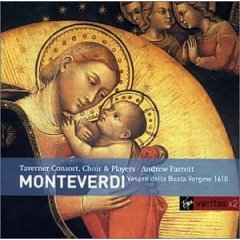October 26, 2007
Gratuitous Llama Musickal Review

I'm really not on a religious kick today, but it just so happens that my new CD of Claudio Monteverdi's Vespro della Beata Vergine (1610) showed up in the mail and I at once had to give it a try.
I've known Monteverdi's Vespers, at least musickally speaking, since my college days, my first edition being a cassette by somebody or other I cannot now even remember. The current CD in my collection is a performance put on by Sir John Eliot Full of Himself Gardiner, the Monteverdi Choir and the English Baroque Soloists. It was recorded live at the Basilica di San Marco, Venice and is a massive affair featuring a pair of full choirs, lots of horns and much doubling up on the instrumentation. It's certainly not a bad performance, but frankly I find it a bit overdone. One sometimes can't hear the music for the singing, as it were, and the echo gets to be annoying.
Anyhoo, I sought out this new CD specifically to get away from those distractions and I'm happy to report that I am not in the least disappointed. This performance, by The Taverner Consort, Choir and Players under the direction of Andrew Parrott, is much smaller in scope. I won't say it's more intimate, for that implies familiarity, which would be improper IMHO for this sort of musick. Rayther, it is on a scale that lets the heart of the musick really shine through with superb clarity. Indeed, I heard things today that I've never noticed before, despite having been listening to the piece for better than 20 years now. And anybody at all familiar with modern period performances of Renaissance and early Baroque music will understand when I say that my old favorites Emma Kirkby and Evelyn Tubb are among the sopranos, I'm saying that the singing is just heavenly.
The production also differs from my Gardiner performance in that it contains a number of passages of Gregorian Chant (Versiculi, Responsorii, Antiphons, Oratorii and a Conclusio) pertinent to the religious service that folks listening for purely musickal pleasure may find distracting. The performance also features a pair of Sonatas composed by Giovanni Paolo Cima, a contemporary of Monteverdi's. (The program notes do not explain these insertions and I'm too lazy to investigate further at the moment. Monteverdi composed the Vespers for Venice and Cima worked primarily in Milan, so I don't know the immediate connection.) Finally, the CD also contains a collection of Psalm settings (specifically, Psalms 109 through 112 and 116 - the Psalms set in the Vespers are 109, 112, 121, 126 and 147) from Monteverdi's Selva morale e spirituale published in 1641. I haven't listened to these yet. However, Monteverdi's style developed considerably in the thirty or so years between these works, and I'm eager to compare the settings - especially those duplicated by the two pieces.
Overall, an excellent CD that I would highly recommend to anybody in the least interested in 400 year old church music (and ask yourself honestly - who wouldn't be?)
Posted by Robert at October 26, 2007 09:23 PM | TrackBackAbstract paintings
Angel painting
animal paintings
ballet paintings
beach painting
Boat painting
building painting
Children painting
Christ painting
church painting
City painting
Cottage painting
Dancer painting
field painting
Floral paintings
Garden painting
Hunting paintings
impressionist painting
Knight painting
Lady painting
Landscape painting
Lighthouse paintings
Music painting
Nude painting
Oriental paintings
Piano painting
Seascapes paintings
Still Life paintings
street painting
sunset painting
Tropical paintings
Venice paintings
Village painting
wine paintingsalvador dali paintings
thomas kinkade paintings
pablo picasso paintings
vincent van gogh paintings
claude monet paintings
diego rivera paintings


 Image courtesy of the lovely and talented
Image courtesy of the lovely and talented 